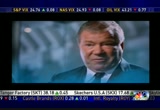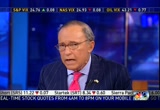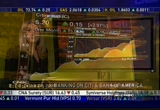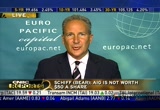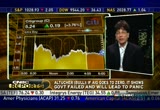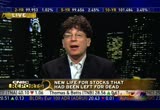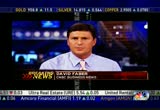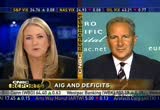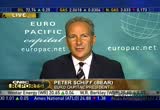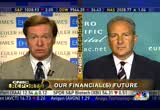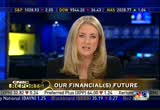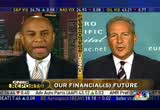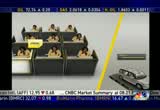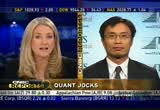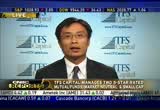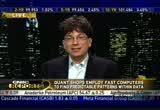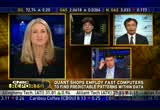tv CNBC Reports CNBC August 28, 2009 8:00pm-8:30pm EDT
8:01 pm
let me conclude, i think the very same free market principles of lower taxes and deregulation and limited government that spur our economic growth over a period of time can be used to help out on the health care reforms. why not put these market principles to work? health care by the way is one of america's greatest industries and job creators. if we leave it alone and don't
8:02 pm
stifle it with a government takeover, health care will help us get a big prosperity boom in the next five to 10 years and longer. that's my take. i want to turn it over to my great friend, mary thompson, on "cnbc reports." mary, you're talking about the great recovery. >> we have a great show ahead, larry. thank you so much. "cnbc reports" starts right now. >> tonight on "cnbc reports." the bulls take a break and the bears win the day but there are several big names that have been down in the dumbs making a comeback now. on that list, aig. look at this chart. up 275% in a month. what's making this stock jump? fannie, freddie, bank of america, citigroup also making moves. in depth on the widely held stocks on the st. if almost everyone else owns them, shouldn't you? what we will learn from the
8:03 pm
kua kuants. >> i'm in for my colleague, dennis kneale. even with a friday fade, the positive news from retailers and bad news on bank those in critical condition topping 400, the death of massachusetts senator ted kennedy. 46 years in office and 77 years on this earth being celebrated tonight by family and close friends at jfk in boston. and tomorrow buried in the arlington cemetery. >> five owe their survival to government intervention. today, trading totaled almost 40% of the big board listed volume. freddie me an and fannie mack, check out this chart. fannie mae up 52% and freddie mac, up 251%. they were in big trouble and now soaring.
8:04 pm
both in hock to the government, citi is up 75% and bank of america on a run as well in the last month, up 35%. really, the standout has been aig, 80% owned by the government. some cite a short squeeze for this rally that squeezed 277%, 277% gain in the last 30 days out of a stock that was struck from the dow 30 last fall. let's bring in our bull and bear to talk about the rise of these stocks that have been left for dead. peter schiff, most lay bear with bullish tendencies and james, generally a bull. great to see a familiar face. i will start with peter, i will start with you. when you see this kind of activity in stocks some had left for dead last fall, what does it tell you about the state of the rally that has the dow up 45% from march lows. >> an old saying about suckers being born every minute. they're gambling, you can trade
8:05 pm
them but they're not viable investments. financials are a great place to work but a lousy place to v. i'd sooner buy and airline. the last thing you want to do is get in bed with the government. there were a lot of stocks around the world, they threw a lot of babies out with the bath water. a lot rose dramatically because they got too cheap in 2008. that's not the case. many of these stocks will go bankrupt by the time they're said and done. many companies, the only reason they're not bankrupt now because the government keeps propping them up. >> sorry to interrupt you there. james, i want to get your take, is there any reason to be bullish on these five stocks. >> funny, i'm bullish on financials in general, these stocks, no, they might very well be worth zero. the government owns 80% of them, heavily shorted. i hate to be a conspiracy theist, i do happen to think -- >> turn off the picture. >> the government is probably taking advantage of this short
8:06 pm
squeeze to short squeeze the short sellers. >> you think the government bis hide in this short squeeze? >> i do think this is a short squeeze the government is manipulating upwards. >> why are they doing that? >> they're protecting their investment to some extent and also good for them if their bailouts are working. the way people think the bailouts are working if the stock market goes up, the stocks go up. >> i doubted they're smart enough to deliberately manipulate them. >> they're pretty smart. >> the fact the interest rates are zero and they're flooding the market with cash, that's the manipulation because people have plenty of money to gamble with. that's what they're doing. >> a lot of people say that's one of the reasons for seeing this big activity. a lot of people say the reason these stocks are getting better because the economy is getting better and less risk adverse and people piling into these stocks because they are so. do you say this recession some people say we're coming out of is only over because it's
8:07 pm
turning into a depression. what do you see the market don't? >> the markets get a lot of things wrong. the markets didn't see this recession coming. the dow was making new highs two months before it began. when ever stocks go up, people look for a way to justify it. the market is going up, people are trying to justify it rationally based on an improving economy. the fact of the matter is stocks are rising even though the economy is not better, we're in worst shape than six months ago, everything the government has done to solve the problem has made it worse. we get a temporary boost but will pay for this. i don't think people are buying stocks because it's like the all clear, they're still risk adverse but understanding the risk in currency, understanding the risk in holding the u.s. dollar and u.s. treasuries when we're printing all this money and people are trying to get rid of those risky assets meaning u.s. dollars and buy something else, something safer. >> what do you think about peter's take on this. >> you look at the data and intel and dell's news, the economy is coming back,
8:08 pm
stabilizing, the consumers are buying computers again and will do so even more so in october when the version 7 windows come out and i think in 2010, it could lead to a boom in the market. >> that's not the economy stabilizing, us trying to reflight the bubble. we don't want customer spending right now. >> we're on the right side. let's take advantage by buying stocks. >> that's not the right side, no. we need consumers saving their money, we don't want them buying anything right now. they've overshot. >> that's how we foq if we're on this side of the bubble, let's buy stocks. >> we will leave it right there. thank you for joining us, both will be back later. right now, we're going to senator john mccain addressing a crowd at the memorial for senator kennedy. >> after we both were satisfied and had sufficiently impressed upon each other the particulars of proper senatorial comportment, we ended our
8:09 pm
discussion and returned to the business that had brought us to the chamber in the first place. i'm happy to report we succeeded in discouraging our colleagues from continuing their intemperament argument. they both deserted the chamber i was later told for i didn't notice their escape rather puzzled if not frightened looks on their faces. [ laughter ] >> when i next saw ted amling down the senate corridor, he was bellowing laughter, that infectious laugh of his that could wake the dead and cheer up the most beleaguered soul. he was good company, excellent company. i think i'm going to miss him more than i can say. we disagreed on most issues, but i admitted -- but i admired his passion for his convictions, his patience with the hard and sometimes dull work of legislating and his uncanny sense for when differences could
8:10 pm
be bridged and his cause advanced by degrees. he was a fierce advocate and no senator would oppose him in a debate without at least a little trepidati trepidation, often more than a little. we all listened to him, of course. he was hard to ignore. when we agreed on an issue and worked together to make a little progress for the country on an important issue, he was the best ally you could have. you never had even a small doubt once his word was given and course of action decided, he would honor the letter and the spirit of the agreement. when we worked together on the immigration issue, we had a daily morning meeting with other interested senators. he and i would meet for a few minutes in advance, and decide between us which members of our respective caucuses needed a little special encouragement, or on occasion a little straight
8:11 pm
talk. if a member tried to back out of a previous commitment, ted made certain they understood the consequences of their action. it didn't a matter him that the offender was a member of his own caucus. he was the most reliable, the most prepared and the most persistent member of the senate. >> there's some straight talk from senator john mccain memorializing senator ted kennedy. he will be buried tomorrow at arlington national cemetery alongside his brothers. still more ahead. aig, the stock is soaring, up 275% in a month. why? we're talking about the big comeback next. also tonight, why you need to care about the quants. then at 8:30, options action time. you're watching cnbc first in business world-wide.
8:15 pm
tropical storm danny packing a punch. some say it will bring heavy rain to long island, and already causing high surf advisories and riptides up and down the east coast. stay out of the water this weekend. now for a storm flood of money. look at ai g, the stock up 276%. in real money terms, if you bought $10,000 worth of aig stock a month ago, you'd have almost $28,000 today. if you bought the stock five years, or you'd still be down 98%. still, aig selling at 50 bucks a share, does it tell us the recovery train is full steam ahead or does the deficit of $9 trillion signal it will come to a stretching halt? we have another panel of bulls and bears. first bulls, joe miller, chief strategist for wall street capital. dan, chief economist and bears, paul, president of heritage capital and peter schiff, president of eurocapital.
8:16 pm
peter, thick we gotten an inkling what you think of aig at 50 and i want to query the others if they think this stock means anything. paul, start with you. keep in mind, they reverse split at 1 for 20. had they not done that a psychologically great move the stock is still a penny stock. they owe the government up to 1$180 billion. will they repay it? to me, the stock is worth nothing. could it go higher? of course there, could be a short squeeze, manipulation, but to me, it's dead money. >>joe what about knew. >> believe it or not, i'm still very bullish on the economy. i have to agree in this case. i don't think there was anything fundamentally changed in the structure of aig to change their position and make the stock run up. i think it's a lot of speculation and fear. ultimately what will happen as the mom and pop buyers who started chasing this stock, the people who got in early will get out and see it fall. >> the new ceo said he will take
8:17 pm
his time to sell assets and reached out to one of the company's former ceo, hank greenberg one who saw it bullish. do you see any positive in this stock at this level? >> if you're looking at aig thinking about investing, you ask yourself, i do want to buy shares of the u.s. government that owns that company. the answer is probably no because private business has the mandate to create value whereas government has the mandate to redistribute that value. i think it's unattractive given who owns 80% of the shares. >> that this is next thing we want to talk about given aig wouldn't be where it was if it wasn't for government help or citi or bank of america, those who repayed t.a.r.p. money, was that a good thing or bad thing? we start with peter. >> they were bad any way you
8:18 pm
look at it. there's no constitutional authority for the government bail out these companies and sets a terrible precedent for more ral hazard, punish the successful to prop up the unsuccessful. bailouts have basically interest feared with a genuine recovery. we need to restructure our economy. in order to have capital better allocated a lot of businesses need to fail. many companies bailed out propped up should have failed. instead, we're diverting other resources from other sectors of the economy that need to expand to generate a lasting recovery. we're delaying the pain, turn this recession into a depression, making the same mistakes of hoover and roosevel roosevelt. >> quickly a rebuttal from the bulls side. if there wasn't a bailout, would we be in far worse shape than now? i agree. that was a scary time. when lehman brothers failed, suddenly the world came to an
8:19 pm
end as far as the financial markets are concerned. i think it could have spiraled much worse. i have to agreen the regular operating of capitalist economy, you have to let capitals die, but that was a time we needed to save them. >> i want to get to two issues quickly. will start with paul on this one. there was an op-ed in the "new york times" by paul krugman, the economist saying deficits are actually a good thing long term, worrisome but not catastrophic. what's your take on that. >> in recessionary time you haves to run deficits. tax receipts go down. government will spend the normal-deutsche can argue whether they're okay, long term, i don't agree. if we're going run 9 and $10 trillion long term debts and continue to spiral up, we're mortgaging half a generation, bad for everyone all around,
8:20 pm
absolutely must round. >> joel, wasn't to ask you one last question, this on the banks because we see increase on banks on the critical list. how worried should the economy be about this? if you look at the markets, it doesn't appear they're that worried about a banking system growing increasingly fragile agai again? >> i think we will be okay there. we are going through this cycle again and have banks fell and mega banks and the small business owner cannot get the financing they need continue to grow and have small community banks come back into the marketplace. i disagree with the comment those of banks failing. they shouldn't fail mainly the bigger issue is the consumer. if the consumer is scared and fearful they will not infuse capital back into the economy. >> you don't infuse capital in the economy by spending, we want to scare consumers out of reckless spending, they need to save money and don't want to encourage it. >> we're doing that now anyway.
8:21 pm
>> we don't want to do that. >> we would have a disaster on your hand. >> it shows you give out nobel prizes to anybody. >> we will leave it there. thank you for your time. thanks for joining us. next up on "cnbc reports," we will be talking. here from the people smart enough to figure out ways for the computer to make the tough decisions and see what the computers are saying. don forget, coming up, options action. and those stocks and where they stand going into the weekend. >> next one trade tech portfo o portfolios. what is it? options action. next. your old mop will just have to get over it... [ engine rattles ] [ man ] love stinks! ♪ love stinks! ♪ yeah! yeah!
8:22 pm
[ female announcer ] new swiffer wet jet is redesigned. it cleans deep in corners. its solution penetrates layers of dirt and its absorbent pad locks it away to clean better than a mop. the newly redesigned swiffer wet jet. ♪ love stinks! are working from the road using a mifi-- a mobile hotspot that provides up to five shared wi-fi connections. two are downloading the final final revised final presentation. - one just got an email. - woman: what?! hmph.
8:23 pm
it's being revised again. the copilot is on mapquest. and tom is streaming meeting psych-up music - from meltedmetal.com. - ( heavy metal music playing ) that's happening now with the new mifi from sprint-- the mobile hotspot that fits in your pocket. sprint. the now network. deaf, hard-of-hearing, and people with speech disabilities access www.sprintrelay.com.
8:24 pm
cnbc's senior economics reporter steve leisman getting a big score monday all day on cnbc watch parts of this is interview with new york reserve fed president. we will give you an edge, called quant jocks. based on quantitative analysis. they use computer based models to figure out if investments are attractive or not. if computers can beat world class chess champion, shouldn't they be able to beat the s&p
8:25 pm
500? the market neutral is a long short u.s. equity fund and tss small cap is long only and up more than 53% year-to-date. james joins us again, he is a quant guy and a stock picker.com. their managing editor. thanks for joining us. chao, i want to start with you because we had james on earlier. what are you overweight in your models? >> mary, thank you for having me on the show. in general, our fund doesn't take big positions in market direction or sectors. we're slightly overweight, basic materials and utilities, we're underweight consumer goods and financials. >> so what does this tell knew why is your model choosing this particular weighting? >> i think at this time, it makes sense, is consist with what most people have been he
8:26 pm
hearing and saying. that is that the economy seems to be in a recovery but generally believed that consumers are -- consumer spending is going to be weak and also bank assets will have more losses to come. >> that's the underweight financials in consumers. james, i want to talk to you or ask you because you follow the hedge fund industry in particular. what strategies are working better than others right now? >> right now the best quant approach is take the stocks utterly crushed and have high number of short sellers and go long those and short the stocks that have essentially very little short selling. in other words, actually going long on the garbage companies and short the quality companies because that's the trade that worked the past few months. >> those companies would include aig, and amtrak and mba. they have been on a terror recently. >> sure. they have been heavily shorted.
8:27 pm
25% short coming into this week. >> we want to bring in paul, president of heritage capital with us earlier. tell us why you don't depend on quants to build your portfolio. hard to argue with a 53% return chao has been able to deliver to his investors. >> i think they have done a wonderful job and i commend them. i don't think you can pick any one single strategy and say that's the end-all be all over the next five years. does quant belong in a portfolio? sure. a couple of ours are quant based. like anything else, portfolio insurance before the '87 crash and index, all these things in and out of vogue, if you put url egg is in that one basket like july of '07, the quant funds had a mini blow-up, you need diversity of strategies and diversity of asset classes. >> what is your response to
8:28 pm
that? don't you have that kind of confidence? >> i would love it if everyone gave me all their money. i think paul's exactly right. the appeal of the quant fund is that they diversify you away from the market. our funds are managed such that the return stream is uncorrelated to that of the market. he's right, you need to diversify and invest some of your money in the market and some in alternative assets like quantitative funds. also to his point of not investing in only one strategy, that's exactly what we do, is that we diversify across many strategies and we're continuously developing different strategies. >> guys, i want to thank you very much for joining us. that wraps up this segment. options actions, keep it tuned on cnbc, remember, coming up at 8:30 eastern time. don't miss it.
355 Views
IN COLLECTIONS
CNBC Television Archive
Television Archive  Television Archive News Search Service
Television Archive News Search Service 
Uploaded by TV Archive on

 Live Music Archive
Live Music Archive Librivox Free Audio
Librivox Free Audio Metropolitan Museum
Metropolitan Museum Cleveland Museum of Art
Cleveland Museum of Art Internet Arcade
Internet Arcade Console Living Room
Console Living Room Books to Borrow
Books to Borrow Open Library
Open Library TV News
TV News Understanding 9/11
Understanding 9/11